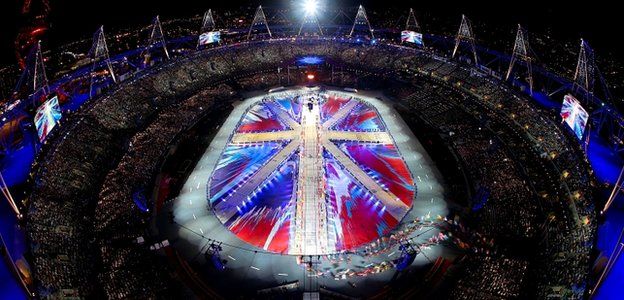Will Olympics prove a bargain for UK soft power gains?
- Published
- comments

The Olympic Games have proven to be a potent exercise in "soft power" for the United Kingdom.
In this day and age, when Britain sometimes struggles to justify its status as a permanent member of the United Nations Security Council or as a "major player on the world stage", the medal table may prove to be a more accurate measure of international standing than the size, for example, of the GDP or the armed forces.
Can it really be true that a clutch of Olympic bullion might cause the wider world to admire a country, or most importantly in the case of Britain, reassess old attitudes towards it?
One columnist in the Washington Post argued this morning, "the English snob caricature… doesn't fit anymore".
The presenter of Russia's RenTV meanwhile said at last night's closing ceremony, "this Olympiad has proven that Britain is strong not only in music but in sports, too".
Meritocracy?
In this age, sporting heroism counts for more than the martial prowess of old. So the likes of Mo Farah, Jessica Ennis, or Louis Smith are potent symbols for a modern democracy - embodying the triumph of merit over birth, race, or social advantage.
Traditionally the United States and Australia have benefited most from the idea that they are meritocracies that allow anyone who reaches their shores a fair shake, but now Britain can come a little closer to that ideal.
Its infrastructure, rule of law, and climate for opportunity have been emphasised in a more effective way than appearing at any number of international Expo events, showing in the process what a fine destination for talent or capital the country is.
If all of that seems a little vague or subjective, consider the efforts that China has made over the past 20 years to achieve sporting greatness. For them, a major haul of medals is as sure a sign of great power status as their space programme or having an aircraft carrier.
The cost of hosting the Olympics was evidently considered a sound investment for Beijing, and will be for Rio de Janeiro, as an announcement of a new found confidence and global status.
When it was announced seven years ago that London had won these games, the benefits seemed less clear cut.
Recession opportunity
In fact the timing has proven serendipitous in allowing the UK, through its staging, a showcase for its national talents at a time of global recession when everybody is competing for investment.
"Billions of television viewers were able to admire Britain's industrial and financial know-how", commented a writer in Le Monde, perhaps contemplating ruefully what might have been if Paris instead had won the games.
If there are Britons who still cavil at the cost (£9-13bn according to varying definitions) and question whether any resulting inward investment could ever match it, then the upkeep costs of sporting greatness, £500m to prepare Team GB for the Rio games (of which just £80m is government money) must surely be a bargain.
How many other positive indicators of global standing are there in which the UK takes third place, beaten only by the US and China?
By comparison Britain's network of embassies and diplomats costs £1.5bn per year.
Of course there are limitations to the Olympic soft power paradigm. India - 55th in the London medal table - simply is not that interested in playing this arena, despite having so many other traits of emerging greatness.
Sport, it is true, also remains an area where some repressively undemocratic countries seek to garner some international respectability.
Negativity
Perhaps the most intriguing questions about whether sport has allowed the UK to re-brand itself internationally lie within the nation itself.
The periodic flare up of the question of how many Team GB medal winners benefited from private schooling suggests an under-confidence about whether this is really a meritocracy.
And the occasionally venomous online social media response to sporting failure - something also highlighted by some foreign journalists reporting from London - shows an undercurrent of envy and negativity.
Even allowing for these blemishes, the global reception for the London Games suggests that the positive has outweighed the negative by a large measure.
And if one considers the billions squandered in MoD procurement failures or in a substantial foreign aid programme that seems to have done little to modify attitudes in some of the largest recipients (eg Pakistan), then the outlay on the London Games appears to have been a sound investment.